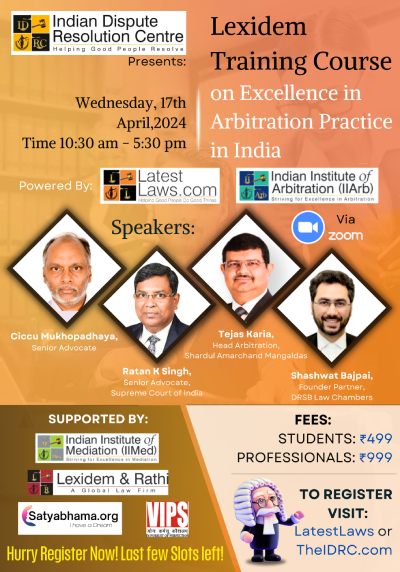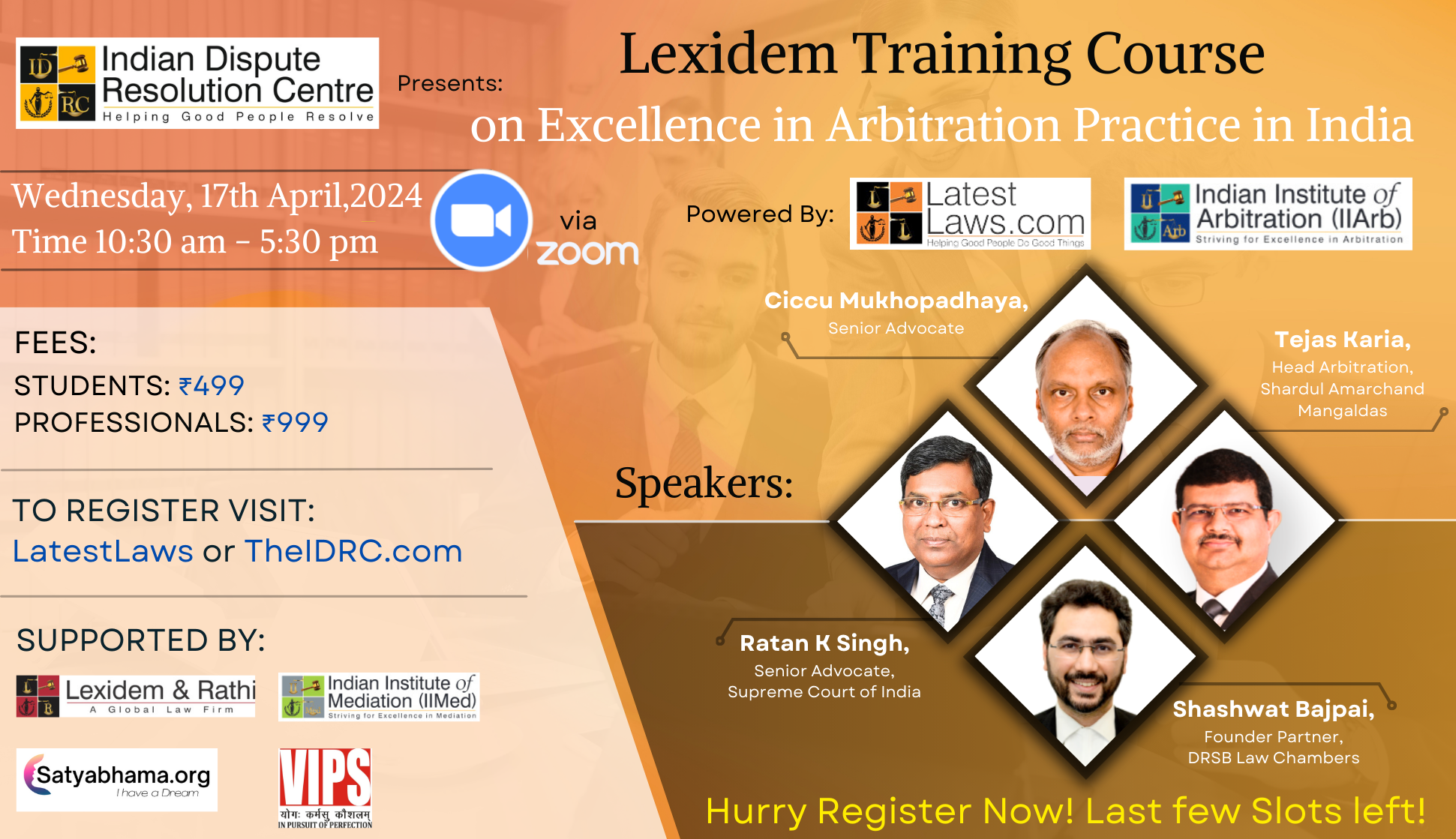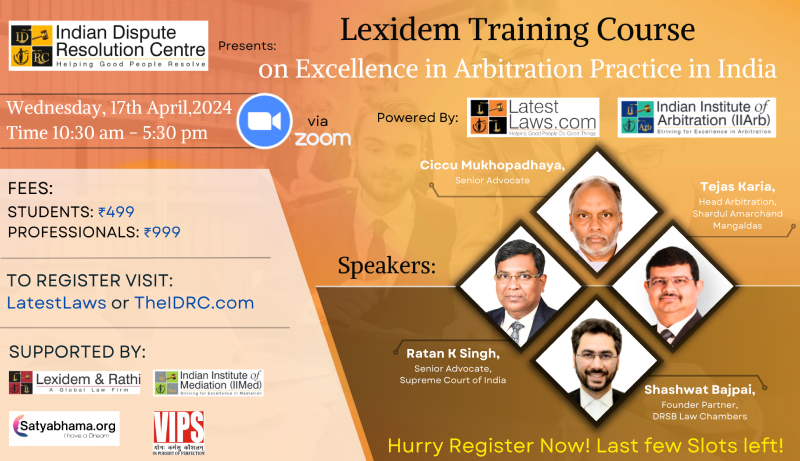February 9, 2019:
The Author, Kopal Chaturvedi is a 2nd year student at National University of Study and Research in Law, Ranchi, Jharkhand. She is currently interning with LatestLaws.com.
Q1. How and why is a social impact assessment study prepared ?
Ans. Whenever the appropriate Government intends to acquire land for a public purpose, it shall consult the concerned Panchayat, Municipality or Municipal Corporation, as the case may be, at village level or ward level, in the affected area and carry out a Social Impact Assessment study in consultation with them.Following steps are involved in making of such a study report-:
- A notification of such a study shall be made available in the local language to the Panchayat, Municipality or Municipal Corporation, as the case may be, and in the offices of the District Collector, the Sub-Divisional Magistrate and the Tehsil, and shall be published in the affected areas, in such manner as may be prescribed, and uploaded on the website of the appropriate Government.
- The government in such a case must ensure that appropriate representation is made to the representatives of Panchayat, Gram Sabha, Municipality or Municipal Corporation.
- Such a study must be finished by the government within 6 months of time.
Q2. What does a Social Impact Assessment Study report consists of?
Ans. The report consists the details of the acquisition, whether it is for any public good, the number of families getting affected or displaced by such acquisition, whether this is the minimum land taken after inspecting alternate places, whether the cost incurred will benefit the people in any way.
Q3. What happens when the expert group does not agree with the proposed report?
Ans. The expert group shall make a recommendation within two months from the date of its constitution to the effect that the project shall be abandoned forthwith and no further steps to acquire the land will be initiated in respect of the same. Provided that the grounds for such recommendation shall be recorded in writing by the Expert Group giving the details and reasons for such decision.
- CHAPTER III
Q1. When can the government acquire an irrigational or agricultural land?
Ans. Though it’s not permissible to acquire any irrigational or agricultural multi-cropped land but in exceptional circumstances, as a demonstrable last resort, where the acquisition of the land in aggregate for all projects in a district or State, in no case exceed such limits as may be notified by the appropriate Government considering the relevant State specific factors and circumstances, it may be acquired.
Q2. What measures are taken after acquiring such irrigational or agricultural land?’
Ans.Either an equivalent area of culturable wasteland shall be developed for agricultural purposes or an amount equivalent to the value of the land acquired shall be deposited with the appropriate Government for investment in agriculture for enhancing food-security.
Also, the total acquired area should not exceed the limits of the total net sown area of that district or State, as may be notified by the appropriate Government.
- CHAPTER IV
Q1. What are the powers of the officer appointed by the government for the preliminary survey of the land?
Ans. Such an officer has the following powers:
- To enter upon and survey and take levels of any land in such locality.
- To dig or bore into the sub-soil.
- To do all other acts necessary to make sure whether the land is adapted for such purpose
- To set out the boundaries of the land proposed to be taken and the intended line of the work (if any) proposed to be made thereon.
- To mark such levels, boundaries and line by placing marks and cutting trenches and where otherwise the survey cannot be completed and the levels taken and the boundaries and line marked, to cut down and clear away any part of any standing crop, fence or jungle.
Q2. What is the time limitation for an award? What happens if the award is not made within the time period?
Ans. The Collector shall make an award within a period of twelve months from the date of publication of the declaration. Also, the government has the power to extend the period of twelve months if in its opinion any such circumstances exist.
But if no award is made within that period, the entire proceedings for the acquisition of the land shall lapse.
- CHAPTER V
Q1. How can the government acquire land quickly in case of an emergency?
Ans. In cases of urgency, whenever the appropriate Government so directs, the Collector, on the expiration of thirty days from the publication of the, take possession of any land needed for a public purpose and such land shall thereupon vest absolutely in the Government, free from all encumbrances. Such a land shall be restricted to the minimum area required for the defence of India or national security or for any emergencies arising out of natural calamities or any other emergency with the approval of Parliament: no such acquisition is possible without giving to the occupier at least forty-eight hours notice of his intention to do so, or such longer notice as may be reasonably sufficient to enable such occupier to remove his movable property from such building without unnecessary inconvenience. A compensation of 80 per cent of tender must be made to the occupier or the owner.
Q2. On what grounds can an enquiry be adjourned?
Ans. The collector can adjourn the inquiry on any cause which he deems fit.
- CHAPTER VI
Q1. What are the grounds for the appointment of an administrator? What powers do they exercise?
Ans. Where the appropriate Government is satisfied that there is likely to be involuntary displacement of persons due to acquisition of land, they appoint an officer not below the rank of Joint Collector or Additional Collector or Deputy Collector or equivalent official of Revenue Department to be the Administrator for Rehabilitation and Resettlement. Such an officer should work efficiently, within the time frame. Tasks like the superintendence, directions and control of the appropriate Government and the Commissioner for Rehabilitation and Resettlement, the formulation, execution and monitoring of the Rehabilitation and Resettlement Scheme shall vest in the Administrator.
Q2. Who is a Commissioner for rehabilitation and resettlement? What are his powers?
Ans. An officer appointed by the state government, of the rank of Commissioner or Secretary of that Government for rehabilitation and resettlement of affected families under this Act, is called the Commissioner for Rehabilitation and Resettlement. He is responsible for supervising the formulation of rehabilitation and resettlement schemes or plans and proper implementation of such schemes or plans. Also, he is responsible for the post-implementation social audit in consultation with the Gram Sabha in rural areas and municipality in urban areas.
- CHAPTER VII
Q1. What is the purpose of establishing a National Monitoring Committee?
Ans. For reviewing and monitoring the implementation of rehabilitation and resettlement schemes or plans under this Act, a committee could be set up by the central government. This committee includes members from various concerned ministries and Departments of the Central and State Governments, along with eminent experts from the relevant fields.
Such committees exercising at the state level, by the state government are called State Monitoring Committees.
- CHAPTER VIII
Q1. What are the qualifications for the appointment of a Presiding Officer?
Ans. Such a person should be or should have been a District Judge or should be a qualified legal practitioner for not less than seven years. This Presiding Officer shall be appointed by the appropriate Government in consultation with the Chief Justice of a High Court in whose jurisdiction the Authority is proposed to be established.
Q2. What happens if there is a vacancy in the office of the preciding officer?
Ans. If, for any reason other than temporary absence, any vacancy occurs in the office of the Presiding Officer of an Authority then the Government shall appoint another person in accordance with the provisions of this Act to fill the vacancy and the proceedings may be continued before the Authority from the stage at which the vacancy is filled.
Q3. Which court has the jurisdiction to entertain any dispute relating to land acquisition under this Act?
Ans. No civil court (other than High Court under article 226 or article 227 of the Constitution or the Supreme Court) have jurisdiction to entertain any dispute relating to land acquisition in respect of which the Collector or the Authority is empowered by or under this Act. Also, no injunction shall be granted by any court in respect of any such matter.
- CHAPTER IX
Q1. What happens if there is a dispute relating to the apportionment?
Ans. When the amount of compensation has been settled, if any dispute arises as to the apportionment of the same or any part thereof, or as to the persons to whom the same or any part thereof is payable, the Collector may refer such disputes to the Authority.
- CHAPTER X
Q1. What happens if the amount is not paid before taking the possession of the land?
Ans. In case the amount is not paid on the date of or before the possession is taken, the Collector shall pay the amount awarded with interest thereon at the rate of nine per cent. per annum from the time of so taking possession until it shall have been so paid or deposited. If such compensation or any part thereof is not paid or deposited within a period of one year from the date on which possession is taken, interest at the rate of fifteen per cent. per annum shall be payable from the date or expiry of the said period of one year on the amount of compensation or part thereof which has not been paid or deposited before the date of such expiry.
- CHAPTER XII
Q1. What is the liabililty of a person providing any false or misleading information?
Ans. Any person providing wrong or misleading information shall be liable to be punished with imprisonment of either description for a term which may extend to six months, or with fine which may extend to one lakh rupees, or with both. Any rehabilitation and resettlement benefit availed of by making a false claim or through fraudulent means shall also be recovered by the appropriate Government. If such a person is a government servant, then disciplinary proceedings may be drawn up by the disciplinary proved to be guilty of a mala fide action in respect of any provision of this Act and shall be liable to such punishment including a fine as the disciplinary authority may decide.
Q2. Which courts are competent to take up suits and criminal proceedings under this Act?
Ans. No court inferior to that of a Metropolitan Magistrate or a Judicial Magistrate of the first is competent to try any offence punishable under this Act.
- CHAPTER XIII
Q1. What is the income tax slab fixed for awards under this act?
Ans. No income tax or stamp duty shall be levied or charged on any award or agreement made under this Act, except under section 46 and no person claiming under any such award or agreement shall be liable to pay any fee for a copy of the same.
Q2. Can the government acquire only certain part of a house, leaving the other left over area?
Ans. No, in case the owner of the property is desirous to give away whole of the property, such partial acquirement is not allowed.
Q3. When does the magistrate enforce the surrender?
Ans. If the Collector is opposed or impeded in taking possession of any land, he shall, if a Magistrate, enforce the surrender of the land to himself, and if not a Magistrate, he shall apply to a Magistrate or to the Commissioner of Police, and such Magistrate or Commissioner, as the case may be, shall enforce the surrender of the land to the Collector.
Picture Source :




























